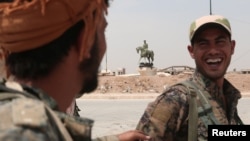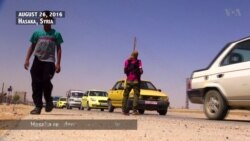One week after deadly clashes broke out between Syrian regime forces and Kurdish fighters, residents of the city of Hasaka in northeastern Syria are returning to their homes amid a Russian-brokered truce.
“We are really happy that nightmare is over,” said Samir Kermeti, a Hasaka resident who stayed in the nearby city of Qamishli during the fighting.
Nearly all of Hasaka’s 150,000 residents fled to neighboring towns as Syrian bombers attacked Kurdish forces in the city last week. At one point, U.S. fighter jets intervened to protect the Kurds. A further threat of escalation eased as Syrian jets left the area.
Fighting continued on the ground for several days. But it stopped after Russian mediation efforts this week brokered an agreement for a cease-fire and a withdrawal of government troops from most of the city.
The Kurdish-majority city had become a flashpoint as Syrian government warplanes targeted Kurdish fighters. It was the first time since the start of Syria’s civil war in 2012 that a Kurdish city was bombed by regime airstrikes.
Protected by US warplanes
In an attempt to stop government airstrikes, the U.S. scrambled aircraft to protect coalition forces, and the Pentagon contacted Russia regarding the situation.
Local residents said the presence of U.S. warplanes helped protect the town and its people.
“People felt that they weren’t alone,” said local reporter Evan Hassib. “The American warplanes indeed saved us from being bombarded by Assad fighter jets.”
Now there is an agreement in place, with the U.S. and Russia involved; people are more comfortable to remain in town, he said.
According to Kurdish commanders, 80 percent of the city is now under the control of the People’s Protection Units (YPG). “The regime only controls the security district,” said Idris Ahmed, head of the local Kurdish forces, known as the Asayish.
Regime tried to play ‘ethnic card’
Hasaka, a multi-ethnic city, is comprised of Kurds, Arabs and Christians. Tensions have occasionally risen among these groups since the beginning of the country’s civil war.
"The [Syrian] regime's scheme was to play the ethnic card," said Hussein Zedo, a Syrian affairs analyst, adding that the goal was to “divide and conquer” to reinforce its reign in the city. "But people of Hasaka rose above their differences and overcame the crisis."
Since 2012, the Kurdish enclave has been administrated by local Kurdish forces after government troops largely withdrew to focus on fighting rebels elsewhere. In major cities like Hasaka and Qamishli, however, government and Kurdish groups have been tacitly sharing control.
The two sides have also worked loosely together against Islamic State militants since 2014.






